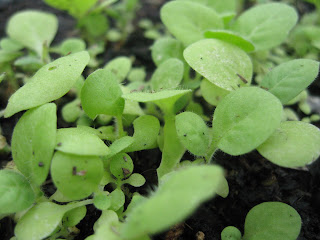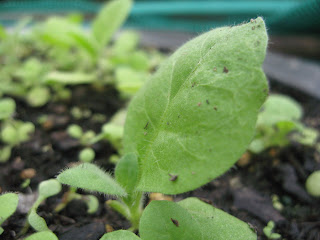As I mentioned last time regarding our little experiment, you must maintain a constant watch to protect your tabaco crop. In this post I will give you a quick summary from Day 43, Day 49 and Day 59. Enjoy the stories and the pictures from each of these updates.
Day 43:
Here we go again! I found some more evidence of pest damage. I quickly scanned through the plants but these caterpillars are well-camouflaged. (I suppose they have to be as they are prey for birds). I found 4 and quickly disposed of them. You can see an example of one at the beginning of the post. If you miss even one, your plants are in danger, so again, either inspect your plants regularly or use insecticide (but you all know my thoughts on the latter option). Anyway, there were plenty of plants that survived. This is the reason tabaco has evolved over time to produce so many seeds. The probability of just one surviving from seed to mature flowering plant is low, so the plant produces thousands and thousands of seeds. And so after cleaning house (or garden), I wait for the plants to grow some more.
Day 49:
By this time the sprouts have had a chance to recover from the caterpillar damage and have regained their color and strength. Again, all I did was check on the plants at least once a day. I personally checked the plants once in the morning and once at dusk. Any hint of damage resulted in me scouring for pests. I found a couple today and quickly terminated them. I apologize, PETA...not. Anyhow, at this point I felt that in another week, the plants would be strong enough for transfer to individual containers.
 Day 49. A healthy return.
Day 49. A healthy return.Day 59:
We have approached the day of transfer. Selection Sunday! (well today is Thursday, but I love March Madness). Not to be confused with transplanting to the open field, transferring is quite simple. What I did today was choose the best-looking candidates from the hundreds of sprouts. I do this so that the plants can have a few more days under their belts and be strong enough to survive the hot, open weather. All I did was inspect each potential candidate and if it looked healthy, strong and green and without damage, I delicately pinched the sprout from the base and dug my fingers beneath the soil and pulled it from the container. TIP: Moistening the soil before pulling the sprouts causes less damage to the plant and root system.
I had soil containers ready (you can buy these at any garden center or Home Depot) filled with the backyard soil (this helps reduce shock to the plant during the transplanting step) and gently planted the sprout. What you have to notice during transfer is the root structure of each tabaco plant. It is simply amazing. Tabaco by its nature is a nutrient-water-hog. Tabaco loves to take from the earth as is evidenced by the impressively abundant root systems.
All-in-all, there were 12 plants that I chose. After transfer was complete, I put the little guys back on the table out back, added life-sustaining water and covered the plants using the homemade see-through tarp. Now that there are less plants from the hundreds that were available, it is even more essential that I maintain a constant watch. At this point the VIPs should thrive as each has its own container of soil and is not competing with crowded neighboring plants. I will let these plants stay as they are anywhere from 10-15 days before we transplant out to the open "field" (ahem, I mean backyard).
It is very hot right now, so the tarp is important in providing shade, but every day these plants survive only makes them stronger. Until next update, check out the Day 59 pictures and let us know what you think. Hopefully, we have inspired a few of you to catch that greenthumb and begin your own tabaco crops.
We have approached the day of transfer. Selection Sunday! (well today is Thursday, but I love March Madness). Not to be confused with transplanting to the open field, transferring is quite simple. What I did today was choose the best-looking candidates from the hundreds of sprouts. I do this so that the plants can have a few more days under their belts and be strong enough to survive the hot, open weather. All I did was inspect each potential candidate and if it looked healthy, strong and green and without damage, I delicately pinched the sprout from the base and dug my fingers beneath the soil and pulled it from the container. TIP: Moistening the soil before pulling the sprouts causes less damage to the plant and root system.
I had soil containers ready (you can buy these at any garden center or Home Depot) filled with the backyard soil (this helps reduce shock to the plant during the transplanting step) and gently planted the sprout. What you have to notice during transfer is the root structure of each tabaco plant. It is simply amazing. Tabaco by its nature is a nutrient-water-hog. Tabaco loves to take from the earth as is evidenced by the impressively abundant root systems.
All-in-all, there were 12 plants that I chose. After transfer was complete, I put the little guys back on the table out back, added life-sustaining water and covered the plants using the homemade see-through tarp. Now that there are less plants from the hundreds that were available, it is even more essential that I maintain a constant watch. At this point the VIPs should thrive as each has its own container of soil and is not competing with crowded neighboring plants. I will let these plants stay as they are anywhere from 10-15 days before we transplant out to the open "field" (ahem, I mean backyard).
It is very hot right now, so the tarp is important in providing shade, but every day these plants survive only makes them stronger. Until next update, check out the Day 59 pictures and let us know what you think. Hopefully, we have inspired a few of you to catch that greenthumb and begin your own tabaco crops.























No comments:
Post a Comment